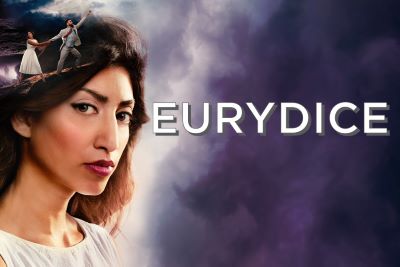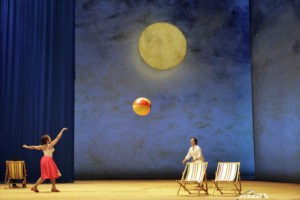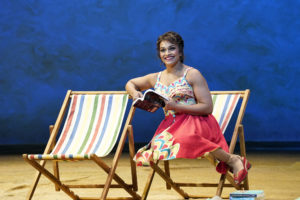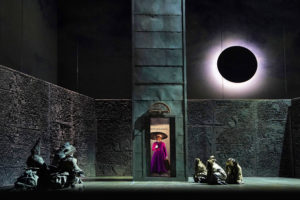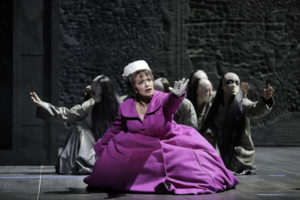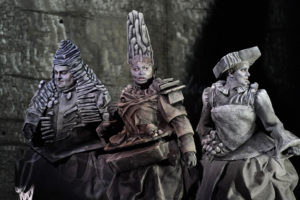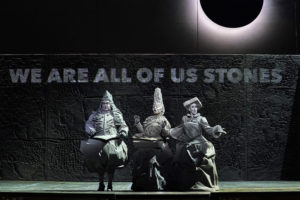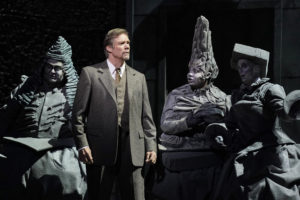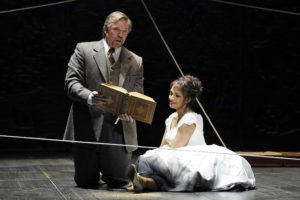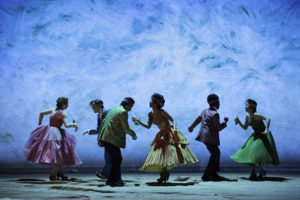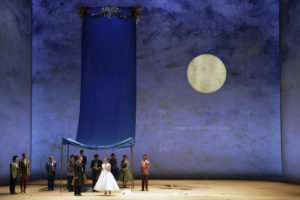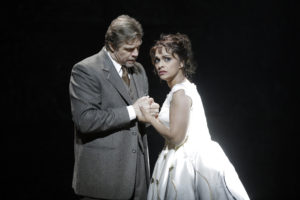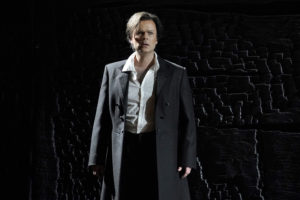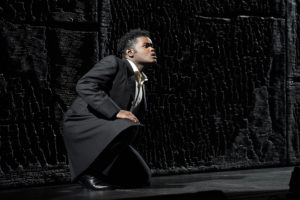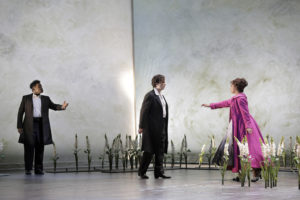MYTH INTERPRETATION
MacArthur Genius Grant-winning composer Matthew Aucoin called up playwright Sarah Ruhl, the Pulitzer Prize finalist who had achieved said nomination with a play about vibrators. But it was in reference to another work of this other MacArthur Genius Grant-winner, a 2003 play called Eurydice. Did she want to make an opera about Orpheus, her husband?
No, I’m still interested in this lady who dies twice, said Ruhl to the man who made an indelible mark with his mainstage conducting debut in LA Opera’s stunning Akhnaten.
Cool, said Aucoin.
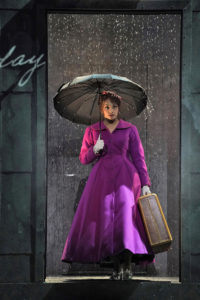 Thus was born Eurydice, a heartbreaking, stinging, slick new opera about the well-known Greek myth that is kind of like an ancient version of the Stanford marshmallow experiment: The gifted musician Orpheus loses his wife and gets the chance to win her back if he can lead her out of hell without looking back. Tragically, he can’t help looking, and she dies again.
Thus was born Eurydice, a heartbreaking, stinging, slick new opera about the well-known Greek myth that is kind of like an ancient version of the Stanford marshmallow experiment: The gifted musician Orpheus loses his wife and gets the chance to win her back if he can lead her out of hell without looking back. Tragically, he can’t help looking, and she dies again.
Mary Zimmerman directs the LA Opera world premiere production, which opens with a delightful beach scene; it’s the kind of time spent with romantic leads that seems to be missing in so much opera. Orpheus and Eurydice speak in loverese; they slip from the mundane to the mushy and back again, just like real lovers; Eurydice (Los Angeles native Danielle de Niese) plaintively asks, multiple times, “Tell me what you are thinking”, in the slightly anxious tones of any partner who knows her other half’s mind is somewhere else. It’s a nice contrast to start the action in the middle of the drama and lovely to get to know the determined and devoted Eurydice, who gets the marriage proposal she wants.
Ruhl wrote the original play after her father’s untimely death; even without knowing that, it is clear that Eurydice’s father, played by the foie gras-voiced Rod Gilfry, is the male lead. We will find Eurydice’s dead dad hanging out in the underworld, writing letters to his daughter. Orpheus’s (Joshua Hopkins) heart is music-obsessed and in love with his wife, but his head is decidedly in the clouds. Because Orpheus, in myth, was part god, the score adds countertenor John Holiday to add an otherworldly element to his singing.
Choreographer Denis Jones’s big dance number of the opera isn’t a solemn ballet, but a “Thriller”-like dance at Eurydice’s wedding party — and all the foreshadowing that implies. It is not enough to hold her interest, and the introverted Eurydice retreats away — but no one’s gonna save her from the beast about to strike.
A man billed as the “interesting man” but who is quite obviously Hades/Satan/Lord of The Underworld entices her to his sketchy penthouse apartment with a white lie about how he received a letter from her father. The Harvey Weinstein of Greek mythology, Hades is incapable of getting an actual girlfriend due to his evil tendencies (think Persephone) and must entrap them instead; he tries to #MeToo her, and she runs away. (According to Aucoin’s notes, Eurydice trips and falls to her death in the underworld, but the cause of death is unclear in the production.)
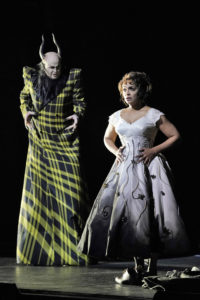 Once there, a trio of stones serves as a Greek chorus (Stacey Tappan, Raehann Bryce-Davis, and Kevin Ray in Ana Kuzmanić’s gorgeous and fanciful costumes); they explain that the dead lose their power of language and their memories as well. It is here that Ruhl’s libretto begins to awaken the disturbingly familiar; hold on, are we talking about Greek mythology here, or are we talking about Alzheimer’s? Eurydice’s disorientation and conviction that she is at a Paris train station will likely put a knot in the stomach of anyone who’s ever encountered a dementia patient. When Orpheus manages to get her a copy of King Lear (apparently worms can be commandeered like the Postmates drivers of the underworld), and she begins to relearn language with her father, is she slightly more alive? Is this a modern parable about the shattering limbo that is the American way of death? Are the nursing home patients who can’t remember their own names, needing assistance with eating and bathing, existing in the shaft of light between a green meadow and the gates of hell — Eurydice? Are we all Orpheus, clinging to hope that our child will snap out of a coma after a terrible accident or celebrating when Grandmother recognizes her kids? Do we think everything will be better if we could have just one last moment with that person?
Once there, a trio of stones serves as a Greek chorus (Stacey Tappan, Raehann Bryce-Davis, and Kevin Ray in Ana Kuzmanić’s gorgeous and fanciful costumes); they explain that the dead lose their power of language and their memories as well. It is here that Ruhl’s libretto begins to awaken the disturbingly familiar; hold on, are we talking about Greek mythology here, or are we talking about Alzheimer’s? Eurydice’s disorientation and conviction that she is at a Paris train station will likely put a knot in the stomach of anyone who’s ever encountered a dementia patient. When Orpheus manages to get her a copy of King Lear (apparently worms can be commandeered like the Postmates drivers of the underworld), and she begins to relearn language with her father, is she slightly more alive? Is this a modern parable about the shattering limbo that is the American way of death? Are the nursing home patients who can’t remember their own names, needing assistance with eating and bathing, existing in the shaft of light between a green meadow and the gates of hell — Eurydice? Are we all Orpheus, clinging to hope that our child will snap out of a coma after a terrible accident or celebrating when Grandmother recognizes her kids? Do we think everything will be better if we could have just one last moment with that person?
The biggest stab to the heart is the stones’ dismissal of Eurydice’s grief which feels humiliatingly contemporary. Who among us hasn’t had grief minimized after a death or a breakup? When the stones say, get over it, don’t be so sad, are they a Greek chorus, or a heartless employer impatient for business to resume as usual after the return from a funeral?
The production is assertively modern; there might be a lord of the underworld, but this world also has light bulbs and water coolers (sets by Daniel Ostling; lights by T.J. Gerckens). That accessibility, coupled with its English libretto, highly familiar myth, and occasional laugh-out-loud moments of humor, make it a decent choice for a non-opera fan companion. You’ve got to have water in a Mary Zimmermann production, and here, while there is disappointingly no actual River Styx to jump into (her triumphant Metamorphoses has Greek gods jumping in and out of a pool), the elevator that brings people to the underworld appears to have pouring water inside, and has the power to wipe memories.
Even the show’s program features a young model on her back, sinking into crashing waves, reminiscent of the tragic heroine and theme song of Showtime’s The Affair. In that show, too, a young woman yearned to know her father, got carried away with an aloof artist, and ended up killed when a lusty devil could not have her.
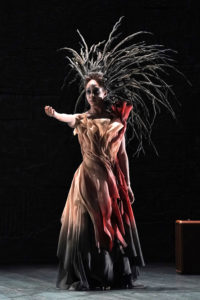 Aucoin’s music is highly varied and delightful; often edgy and trippy, with tumbling piccolo runs and ominous brass (the author conducts, with Grant Gershon leading the splendid chorus). More peaceful passages come when Eurydice and her father are reunited. The Sri-Lankan-Dutch-parented soprano De Niese, holder of an Emmy earned when she was 16 (was there some kind of overachiever requirement for this opera?) handles the demanding role and heavy stage time gorgeously.
Aucoin’s music is highly varied and delightful; often edgy and trippy, with tumbling piccolo runs and ominous brass (the author conducts, with Grant Gershon leading the splendid chorus). More peaceful passages come when Eurydice and her father are reunited. The Sri-Lankan-Dutch-parented soprano De Niese, holder of an Emmy earned when she was 16 (was there some kind of overachiever requirement for this opera?) handles the demanding role and heavy stage time gorgeously.
Will Eurydice ever see the sun? What ensues, in Ruhl’s telling, dismantles Eurydice’s mythological lack of agency and implies that life does not automatically trump death; that one must take into consideration one’s companions in each state. Most heartrendingly, Ruhl calls back, it seems, to Amy Krouse Rosenthal’s 2017 piece in The New York Times‘ Modern Love section, “You May Want to Marry My Husband”: Eurydice writes and sings to Orpheus’s future wife, “Feed him … he forgets and he gets cranky.”
Some things are just universal.
photos by Cory Weaver
Eurydice
LA Opera
Dorothy Chandler Pavilion, 135 North Grand Ave.
ends on October 20, 2019
for tickets, call 213.972.8001 or visit LA Opera
check out the impressively produced Eurydice Found series of lectures and events
